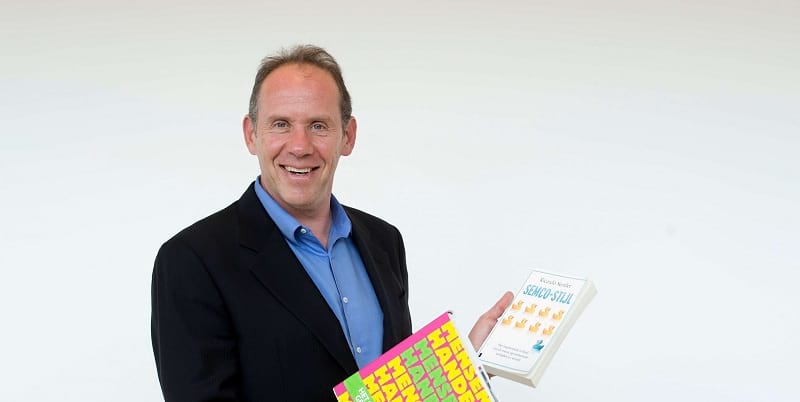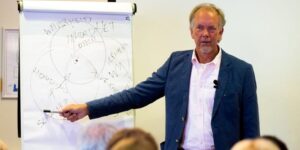Ricardo Semler biography and books

Ricardo Semler (São Paulo, 1959) is a Brazilian entrepreneur and CEO and majority shareholder of Semco Partners. This company, originally specialized in marine pumps, is particularly known for its transformation and radical form of leadership and industrial democracy. Under Semler’s leadership, the company grew from $4 million in value in 1982 to $240+ million in 2016. Ricardo Semler won several awards, including Latin American Businessman of the Year in 1990, and Brazilian Businessman of the Year 1992. His first book was the best-selling non-fiction book in Brazil. After that he wrote a few more bestsellers, including Maverick and The Seven Day Weekend.
Ricardo Semler biography
Student life and education
The company that would grow into a successful company under Ricardo Semler got off to a difficult start. Ricardo was also not the natural successor to his father’s company.
His grades in school were poor and he preferred playing the guitar to reading textbooks. His entrepreneurial spirit was expressed in high school. He took over the school’s snack bar, invested the profits in stocks and made so much money that he took his entire class on a plane vacation.
Professional career
After graduating from high school, Ricardo started working for his father’s company. He slept late, worked from home and found his father’s approach rigid.
In 1980 the Brazilian economy was hit hard, with the shipbuilding industry in particular being affected immensely. The then twenty-year-old Ricardo thought that diversification was the only way to survive. Antonio Semler, his father, however, was convinced that Semco’s specialist focus was its best asset.
Leadership Styles Ricardo Semler and Antonio Semler in Semco
Semler junior and senior clashed regularly over Semco’s focus. They also did not agree on the way of leadership. Antonio preferred the traditional autocratic leadership style, while Ricardo preferred the decentralized and participatory leadership style.
The confrontations between the two regularly got so high that Ricardo threatened to resign and leave the company for good. Antonio wanted to keep the business in the family, so he cut his losses.
Antonio Semler resigned in 1980 and stepped down as CEO of the company. The majority stake was transferred to the then twenty-one-year-old Ricardo. On his first day as CEO, Ricardo fired 60 percent of all top executives. He also started the company’s diversification program.
Health problems Ricardo Semler
In these years, Ricardo increasingly suffered from health problems. While visiting a pump factory in Baldwinsville, he suddenly passed out.
Reason enough for Ricardo to visit a doctor. The doctor determined that Ricardo was dealing with a lot of stress. The message was clear: take rest. Ricardo took this advice to heart and started improving the work-life balance in his life, as well as that of his employees.
At the end of the 1980s, the Nucleus of Technological Innovation (NTI) was established within Semler. This was aimed at developing new companies and product lines that Semler endorsed. After the success of this initiative, eighteen such satellite units were set up. These units soon accounted for 2/3 of the workforce and portfolio.
The Semco style in an economic crisis
Brazilian President Fernando Collor de Mello imposed liquidity restrictions in 1990 to combat hyperinflation. This caused the Brazilian economy to plunge into a downturn.
Many companies went bankrupt as a result. Ricardo Semler managed to make good agreements with his employees.
All employees agreed to a pay cut, on the condition that their share of the profit distribution would be increased to 39%. Top management even gave up 40% of their income and employees were given the right to disapprove or approve all company expenses.
During the crisis, more was demanded of the staff. They sometimes took on multiple roles. As a result, they gained more knowledge of operations within the company.
They were also able to make more suggestions to help the company grow. The reforms implemented during this difficult economic time have resulted in a 65% reduction in inventories. In addition, delivery times were greatly improved and product defects fell to below 1%. As the economic picture in Brazil improved, Semco’s revenues improved significantly.
In 2002, the company had sales of approximately US$212 million. It had about 3,000 employees at the time, up from 90 in 1982.
Recognition and fame for Ricardo Semler
It is clear that through the leadership of Ricardo Semler his father’s company grew into a giant. He received a lot of recognition in his country for this. He was named Brazilian Businessman of the Year 1990 and the World Economic Forum named him one of the Global Leaders of Tomorrow. A committee of the CIO Magazine named Semco one of the best reconstructed companies in the world. The BBC wrote a series on Semco in ‘Reengineering the Business’.
Lumiar School
Part of improving his work-life balance, Semler also found spending time on what was important to him. For that reason, he began to engage in education. He was convinced that traditional management and teaching methods could be much better.
That is why, in 2003, he founded the Lumiar School in Sao Paulo. Central to this school is the idea that children will grow up to be responsible and free-thinking adults when they are not held back by limitations in conventional education.
The Lumiar School resembles Ricardo Semler’s company in many ways. There is no fixed curriculum that must be followed by all students, but the program is completely tailored to the behavior of children. Children are to a certain extent free to experiment and choose subject packages.
Famous quotes
- “The key to getting work done on time is to stop wearing a watch.”
- “The purpose of work is to make the worker – whether a working stiff or a CEO – feel good about life.”
- “One of the things that is very silly – and I hear from educators all the time – is that schools essentially teach kids to learn. They don’t need school for that. Learning is what they do best.”
- “Growth and profit are a product of how people work together.”
- “A high percentage of organizations develop a military rationale, whereby only a very small number of people make all of the decisions. There is little wonder, then, that people aren’t keen to get out of bed and come to work on a Monday morning.”
- “People are responsible adults at home. Why do we suddenly transform them into adolescents with no freedom when they reach the workplace?”
- “The best way to invest corporate profits is to give them to the employees.”
- “The key to management is to get rid of the managers.”
- “If you look at any kind of modern organization and you think, ‘What are the foremost tools of power?’ You will find that it is information.”
- “Only two things grow for the sake of growth: businesses and tumors.”
- “We have absolute trust in our employees. In fact, we are partners with them.”
- “There is no contest between the company that buys the grudging compliance of its work force and the company that enjoys the enterprising participation of its employees.”
- “If you are giving back, you took too much.”
- “If we do not let people do things the way they do, we will never know what they are really capable of and they will just follow our boarding school rules.”
- “Intuition, luck, mistakes, serendipity—there you have four vital business concepts that every manager should know.”
- “But uncontrolled variables are what make dreams come true. If we change the way work works we can live the dream of work-life balance and sustainability.”
- “Moving around limits tribal affiliations that are detrimental to democracy, communication, and innovation.”
- “People have a reservoir of talent worth discovering. They just have to be given the opportunity to discover it in themselves.”
- “Forget socialism, capitalism, just-in-time deliveries, salary surveys, and the rest … concentrate on building organizations that accomplish that most difficult of all challenges: to make people look forward to coming to work in the morning.”
Books and publications by Ricardo Semler
- 2007. Out of this world: Doing things the Semco way. Global Business and organizational excellence, 26(5), 13-21.
- 2003. The seven-day weekend: Changing the way work works. Penguin.
- 2001. Maverick!: the success story behind the world’s most unusual workplace. Random House.
- 2000. How we went digital without a strategy. Harvard Business Review, 78(5), 51-3.
- 1994. Why my former employees still work for me. Harvard Business Review, 72(1), 64.
- 1989. Managing without managers. Harvard business review, 67(5), 76-84
How to cite this article:
Janse, B. (2022). Ricardo Semler. Retrieved [insert date] from Toolshero: https://www.toolshero.com/toolsheroes/ricardo-semler/
Original publication date: 02/02/2022 | Last update: 08/31/2023
Add a link to this page on your website:
<a href=”https://www.toolshero.com/toolsheroes/ricardo-semler/”>Toolshero: Ricardo Semler</a>











